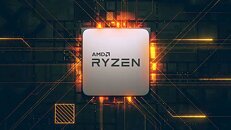Wednesday, August 5th 2020

AMD x86 Market Share Reaches 2013 Level Highs
Mercury Research, one of the electronics industry's premier analyst firms, has revealed its market analysis results - and as you no doubt expected, these paint AMD in a very positive light. According to the company, AMD has reached market share levels it didn't hold since 2013 - a marked improvement over its continuingly dwindling presence in both enterprise's and consumer's minds following some debatable management decisions and technology pursuits.
AMD's Desktop x86 unit share rose to 19.2% in 2Q20, a 0.6% gain over the previous quarter and a very significant 2.1% year-over-year (YoY) increase - a significant achievement following 10 straight quarters of growing market share for the company. However, AMD's mobile chip share paints a much more impressive story, where the company managed to achieve a historic 19.9% of the market - a segment where AMD has long struggled historically, where it embattled a deeply entrenched Intel (and still is battling both Intel and OEM's perceptions and Intel-geared product development and manufacturing workflow). AMD's 2Q18 share in the mobile market was a mere 8.8% - AMD more than doubled its share in just two years, and increased its share by 2.9% over the prior quarter and a 5.8% gain YoY. And that number can only go up, following the extremely warm reception of the company's latest Ryzen 4000 mobile processors, which have already scored 50 design wins with some 30 more designs to be released before year's end.When it comes to enterprise, AMD has achieved a 5.8% market share - which may seem very low; relativize this number with AMD's 0.8% market share back in 4Q17, though, and you'll see this is nothing short of groundbreaking. AMD's CEO Lisa Su, however, has said that the company has already broken the two-digit barrier in market share for the server market - we'll definitely be seeing more details on this soon.
However you paint it, these are historic results for AMD, and paint a much healthier picture of the x86 market than we've seen in years.
Sources:
Mercury Research, via Tom's Hardware
AMD's Desktop x86 unit share rose to 19.2% in 2Q20, a 0.6% gain over the previous quarter and a very significant 2.1% year-over-year (YoY) increase - a significant achievement following 10 straight quarters of growing market share for the company. However, AMD's mobile chip share paints a much more impressive story, where the company managed to achieve a historic 19.9% of the market - a segment where AMD has long struggled historically, where it embattled a deeply entrenched Intel (and still is battling both Intel and OEM's perceptions and Intel-geared product development and manufacturing workflow). AMD's 2Q18 share in the mobile market was a mere 8.8% - AMD more than doubled its share in just two years, and increased its share by 2.9% over the prior quarter and a 5.8% gain YoY. And that number can only go up, following the extremely warm reception of the company's latest Ryzen 4000 mobile processors, which have already scored 50 design wins with some 30 more designs to be released before year's end.When it comes to enterprise, AMD has achieved a 5.8% market share - which may seem very low; relativize this number with AMD's 0.8% market share back in 4Q17, though, and you'll see this is nothing short of groundbreaking. AMD's CEO Lisa Su, however, has said that the company has already broken the two-digit barrier in market share for the server market - we'll definitely be seeing more details on this soon.
However you paint it, these are historic results for AMD, and paint a much healthier picture of the x86 market than we've seen in years.

6 Comments on AMD x86 Market Share Reaches 2013 Level Highs
All gpu servers this gen are rome/milan...